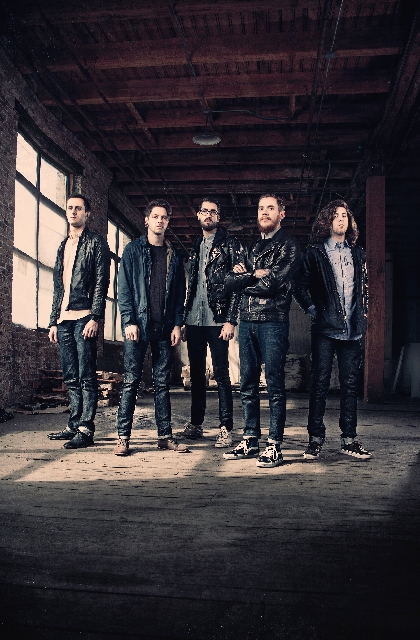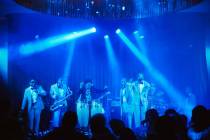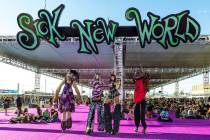The Devil Wears Prada singing of salvation

Traditionally, heavy metal and Jesus haven’t had all that much in common aside from hair length.
Sure, there have long been Christian hard rock bands, ranging from glam (Stryper) to death metal (Believer) to grunge lite (Creed), but they were always the outliers in their respective subgenres, the white-fleeced interlopers amid so many black sheep.
But in recent years, there has been a groundswell of pious metalcore acts, dozens and dozens of bands who sing of salvation while sounding like Satan with a pulled groin.
Perhaps the biggest band of that ilk is The Devil Wears Prada, whose past two albums have debuted inside the top 15 on the Billboard album chart.
The Dayton, Ohio-born group isn’t big on proselytizing, but they do acknowledge their faith at some point during their live shows and don’t bristle at discussing their religious views, unlike some of their peers.
“Obviously, a part of being a Christian is discipleship,” singer Mike Hranica says. “So I want people to come away from our shows thinking about beliefs and hopefully even becoming a part of it. But I also want to promote and encourage healthy thinking.
“Regardless of whether people come away from our show saying ‘I want to find a church’ or ‘I’m going to go home and read my Bible,’ I think that if you’re going home encouraged to do something better or to be a little bit more generous, that’s what I want people to take away from it,” he continues. “I think people take something from our shows that’s not just, ‘We went there and screamed and drank a few beers and banged our heads’ and that’s that.”
In terms of sheer sonics, though, there’s nothing heavenly about this bunch.
Hranica’s bellicose bark is suggestive of a man angry at his vocal chords and determined to punish them severely.
He doesn’t even really consider himself a singer.
“I don’t really see it as a particular art form,” Hranica says.
Hranica’s battered larynx is contrasted with the more melodic singing of guitarist Jeremy DePoyster, which registers like a single shaft of light penetrating an otherwise dark room.
And then it’s back to the grind.
There’s no levity here, just unrelenting, punishing sound where the band is a hammer and you’re the nail.
And yet, if you pay attention to what these dudes are actually saying — and we wouldn’t suggest trying to do so without a lyric sheet in hand — their words can seem incongruous with the roar that engulfs them.
“I came for peace, and for great reason,” they announce on “Mammoth” from their most recent disc, 2011’s “Dead Throne.”
Peace?
Sounds more like all-out war.
But for Hranica, who says that he doesn’t consider his lyrics to be especially positive and tends to write “very depressive stuff,” generalized angst holds little appeal.
“I never had the, ‘I hate God’ or ‘I hate my parents’ or ‘I hate everyone’ phase,” he says, “but I’ve always had that really strong draw to aggression. There are stereotypes with this sort of music as far as rebellion goes, but none of my stuff is really rebellious against religion or the government or things like that. If there is that sort of rebellion, it’s more against mediocrity.”
Throughout a 30-minute conversation, Hranica repeatedly returns to what emerges as his central thrust: Metal needs to become more enlightened.
“Why is it that with indie bands, their opinions are just so much more evolved and progressive than what’s in metal?” he asks. “People can be more tasteful and stylish. You get a lot of that in the indie world, but you really don’t see it in metal, and I hate that.
“I can be at either side of the spectrum as far as metal goes,” he adds. “A lot of it, I hate. I hate that it’s so boorish and dull and stereotypical and predictable. The preconceived notions of metal and aggressive music are not respectable.
“I wouldn’t call them accurate, either, but I would like to see metal become more intelligent.”
To this end, Hranica says that he just wants to get his listeners to think more.
This is why he tries not to spell things out too much in his lyrics.
There is some room for interpretation, but, according to him, the main thing is to open eyes — even if, once opened, said eyes don’t always see things the same way he does.
“Obviously, I’m very opinionated,” Hranica says. “I have my beliefs. I have my faith, but at the same time, I try to leave things a little bit open ended. That’s always been a really important aspect of the band, and very intentionally so. That’s something that I want people to take away.
“You don’t have to agree with us to listen to our music.”
Contact reporter Jason Bracelin at jbracelin@
reviewjournal.com or 702-383-0476.
Preview
The Devil Wears Prada
5:30 p.m. Wednesday
House of Blues at Mandalay Bay, 3950 Las Vegas Blvd. South
$27-$30 (632-7600)


















